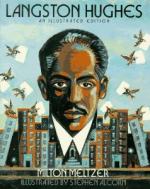|
This section contains 1,089 words (approx. 4 pages at 300 words per page) |

|
With his essay "The Negro Artist and the Racial Mountain" (1926), writer Langston Hughes helped to define the spirit that motivated the Harlem Renaissance, a black cultural movement of the 1920s. In the essay, he argues against blacks seeking integration at the expense of race pride and proclaims that instead "we younger artists who create now intend to express our individual dark-skinned selves without fear or shame," a bold statement for those racially unsettling times that were marked by lynchings and riots. Perhaps his determination to affirm, indeed revel in, black culture had something to do with his father's hatred of black people, a sentiment that affected the son profoundly. Hughes wrote in his autobiography The Big Sea (1940) that "my father hated Negroes. I think he hated himself, too, for being a Negro." Unlike his father, early in life Hughes had been seduced by the...
|
This section contains 1,089 words (approx. 4 pages at 300 words per page) |

|


